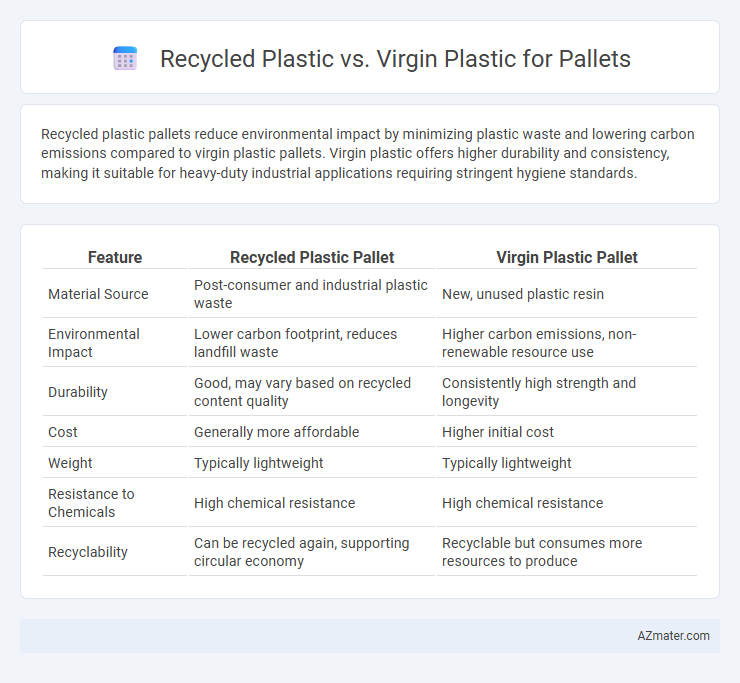Recycled plastic pallets reduce environmental impact by minimizing plastic waste and lowering carbon emissions compared to virgin plastic pallets. Virgin plastic offers higher durability and consistency, making it suitable for heavy-duty industrial applications requiring stringent hygiene standards.
Table of Comparison
| Feature | Recycled Plastic Pallet | Virgin Plastic Pallet |
|---|---|---|
| Material Source | Post-consumer and industrial plastic waste | New, unused plastic resin |
| Environmental Impact | Lower carbon footprint, reduces landfill waste | Higher carbon emissions, non-renewable resource use |
| Durability | Good, may vary based on recycled content quality | Consistently high strength and longevity |
| Cost | Generally more affordable | Higher initial cost |
| Weight | Typically lightweight | Typically lightweight |
| Resistance to Chemicals | High chemical resistance | High chemical resistance |
| Recyclability | Can be recycled again, supporting circular economy | Recyclable but consumes more resources to produce |
Introduction to Plastic Pallets
Plastic pallets, widely used for transporting and storing goods, are manufactured using either recycled or virgin plastic materials, each offering distinct environmental and performance benefits. Recycled plastic pallets contribute to sustainability by reducing plastic waste and lowering production energy consumption, while virgin plastic pallets typically provide enhanced durability and consistent quality. Choosing between recycled and virgin plastic pallets depends on factors such as load capacity, environmental goals, and cost efficiency.
Overview of Virgin Plastic Pallets
Virgin plastic pallets are manufactured using 100% new, high-quality polymer resins, ensuring consistent strength, durability, and chemical resistance. These pallets offer superior load-bearing capacity and longer lifespan compared to recycled options, making them ideal for demanding logistics and storage applications. Their homogenous material composition reduces contamination risks, complying with stringent hygiene standards in industries such as food and pharmaceuticals.
What Are Recycled Plastic Pallets?
Recycled plastic pallets are manufactured using plastic materials that have been reclaimed and processed from post-consumer or post-industrial waste, reducing environmental impact compared to virgin plastic pallets made from new, raw polymers. These pallets offer comparable durability, strength, and resistance to moisture, chemicals, and insects, making them a sustainable choice for shipping and storage solutions. Utilizing recycled plastic pallets significantly lowers carbon footprint and supports circular economy practices by diverting plastic waste from landfills and oceans.
Production Process: Virgin vs Recycled Plastic
Virgin plastic pallets are produced using raw petrochemical materials through processes such as injection molding or extrusion, ensuring high purity and consistent polymer quality. Recycled plastic pallets involve collecting, sorting, cleaning, and melting post-consumer or post-industrial plastic waste before molding, which can introduce variability in polymer properties and require additional processing steps. The production process of recycled plastic is more energy-efficient and reduces environmental impact by minimizing virgin resource extraction and landfill waste compared to virgin plastic manufacturing.
Environmental Impact Comparison
Recycled plastic pallets significantly reduce environmental impact by lowering carbon emissions and conserving natural resources compared to virgin plastic pallets, which require new raw materials derived from fossil fuels. The production of recycled plastic pallets consumes less energy and reduces landfill waste by repurposing plastic materials, contributing to circular economy goals. Virgin plastic pallets generate higher greenhouse gas emissions due to energy-intensive extraction and manufacturing processes, exacerbating pollution and resource depletion concerns.
Cost Differences and Economic Benefits
Recycled plastic pallets generally cost 20-40% less than virgin plastic pallets due to lower raw material expenses and reduced energy consumption during manufacturing. Using recycled plastic supports circular economy principles by minimizing waste and decreasing reliance on fossil fuels, ultimately leading to significant long-term cost savings for businesses. Additionally, recycled plastic pallets offer comparable durability and strength, making them a cost-efficient and economically sustainable choice in supply chain logistics.
Durability and Performance Analysis
Recycled plastic pallets offer comparable durability to virgin plastic pallets, often featuring enhanced resistance to moisture, chemicals, and impact due to the blending process during manufacturing. Performance analysis indicates recycled plastic maintains structural integrity under heavy loads and prolonged use, though virgin plastic pallets typically exhibit more consistent mechanical properties because of their uniform polymer composition. Industry studies highlight that recycled plastic pallets are a sustainable choice that balances durability with environmental benefits without compromising essential performance in logistics and material handling.
Safety Standards and Regulatory Compliance
Recycled plastic pallets often meet or exceed safety standards such as FDA and USDA compliance, ensuring suitability for food and pharmaceutical industries, while virgin plastic pallets provide consistent quality with lower risk of contamination due to their raw material origin. Both materials must adhere to regulations like ISO 8611 and ANSI MH1 for load capacity and durability, but recycled plastics undergo stricter testing protocols to confirm contaminants are eliminated. Regulatory compliance for recycled pallets emphasizes traceability and certification to guarantee safety, reducing environmental impact without compromising performance in logistics and storage.
Applications in Various Industries
Recycled plastic pallets are widely used in industries such as agriculture, manufacturing, and retail due to their cost-effectiveness and environmental benefits, offering durability for transporting goods while reducing plastic waste. Virgin plastic pallets dominate sectors requiring stringent hygiene standards like pharmaceuticals and food processing, ensuring contamination-free handling and consistent quality. Both types support supply chain efficiency, with recycled pallets promoting sustainability and virgin pallets providing superior strength and longevity for heavy-duty applications.
Future Trends in Sustainable Pallet Solutions
Recycled plastic pallets are gaining traction due to their reduced environmental impact, lower carbon footprint, and circular economy benefits, while virgin plastic pallets offer consistent quality and durability. Advances in recycling technology are enhancing the mechanical properties of recycled materials, making them more competitive with virgin plastics in strength and longevity. Future trends show an increasing integration of biodegradable additives and innovation in closed-loop recycling systems to further improve sustainability in pallet manufacturing.

Infographic: Recycled plastic vs Virgin plastic for Pallet
 azmater.com
azmater.com